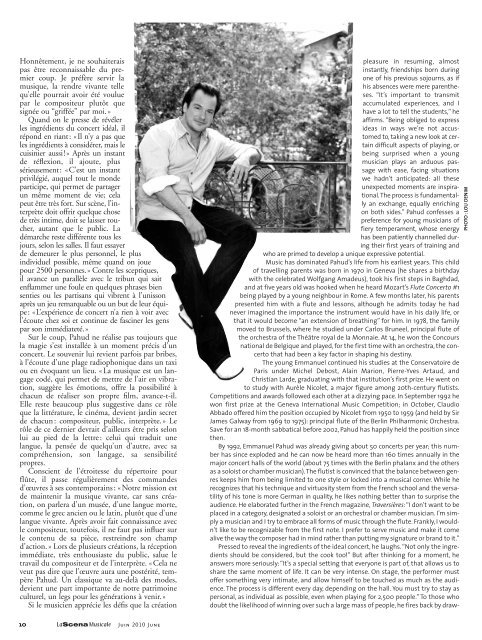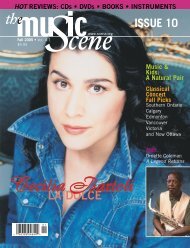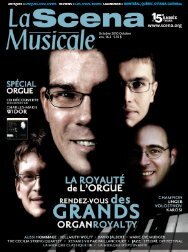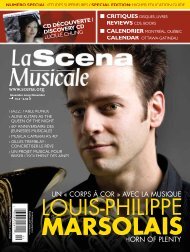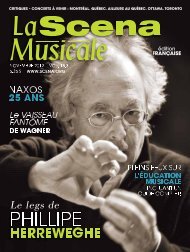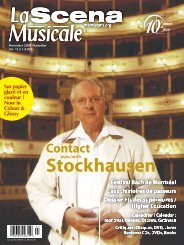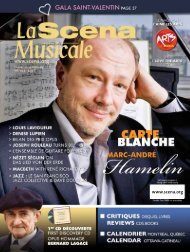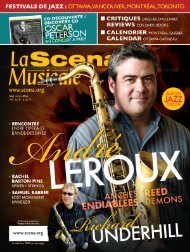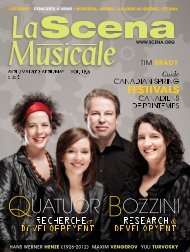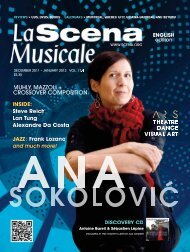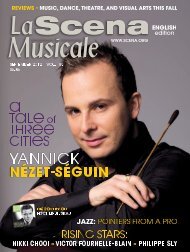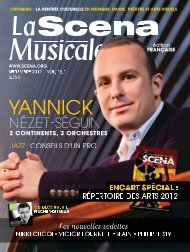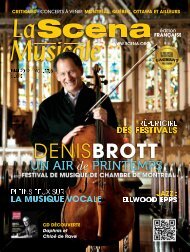Adobe Acrobat PDF complet (18 MB) - La Scena Musicale
Adobe Acrobat PDF complet (18 MB) - La Scena Musicale
Adobe Acrobat PDF complet (18 MB) - La Scena Musicale
You also want an ePaper? Increase the reach of your titles
YUMPU automatically turns print PDFs into web optimized ePapers that Google loves.
Honnêtement, je ne souhaiterais<br />
pas être reconnaissable du premier<br />
coup. Je préfère servir la<br />
musique, la rendre vivante telle<br />
qu’elle pourrait avoir été voulue<br />
par le compositeur plutôt que<br />
signée ou “griffée” par moi. »<br />
Quand on le presse de révéler<br />
les ingrédients du concert idéal, il<br />
répond en riant: «Il n’y a pas que<br />
les ingrédients à considérer, mais le<br />
cuisinier aussi!» Après un instant<br />
de réflexion, il ajoute, plus<br />
sérieusement: «C’est un instant<br />
privilégié, auquel tout le monde<br />
participe, qui permet de partager<br />
un même moment de vie; cela<br />
peut être très fort. Sur scène, l’interprète<br />
doit offrir quelque chose<br />
de très intime, doit se laisser toucher,<br />
autant que le public. <strong>La</strong><br />
démarche reste différente tous les<br />
jours, selon les salles. Il faut essayer<br />
de demeurer le plus personnel, le plus<br />
individuel possible, même quand on joue<br />
pour 2500 personnes.» Contre les sceptiques,<br />
il avance un parallèle avec le tribun qui sait<br />
enflammer une foule en quelques phrases bien<br />
senties ou les partisans qui vibrent à l’unisson<br />
après un jeu remarquable ou un but de leur équipe:<br />
«L’expérience de concert n’a rien à voir avec<br />
l’écoute chez soi et continue de fasciner les gens<br />
par son immédiateté.»<br />
Sur le coup, Pahud ne réalise pas toujours que<br />
la magie s’est installée à un moment précis d’un<br />
concert. Le souvenir lui revient parfois par bribes,<br />
à l’écoute d’une plage radiophonique dans un taxi<br />
ou en évoquant un lieu. « <strong>La</strong> musique est un langage<br />
codé, qui permet de mettre de l’air en vibration,<br />
suggère les émotions, offre la possibilité à<br />
chacun de réaliser son propre film, avance-t-il.<br />
Elle reste beaucoup plus suggestive dans ce rôle<br />
que la littérature, le cinéma, devient jardin secret<br />
de chacun : compositeur, public, interprète. » Le<br />
rôle de ce dernier devrait d’ailleurs être pris selon<br />
lui au pied de la lettre : celui qui traduit une<br />
langue, la pensée de quelqu’un d’autre, avec sa<br />
compréhension, son langage, sa sensibilité<br />
propres.<br />
Conscient de l’étroitesse du répertoire pour<br />
flûte, il passe régulièrement des commandes<br />
d’œuvres à ses contemporains : « Notre mission est<br />
de maintenir la musique vivante, car sans création,<br />
on parlera d’un musée, d’une langue morte,<br />
comme le grec ancien ou le latin, plutôt que d’une<br />
langue vivante. Après avoir fait connaissance avec<br />
le compositeur, toutefois, il ne faut pas influer sur<br />
le contenu de sa pièce, restreindre son champ<br />
d’action. » Lors de plusieurs créations, la réception<br />
immédiate, très enthousiaste du public, salue le<br />
travail du compositeur et de l’interprète. « Cela ne<br />
veut pas dire que l’œuvre aura une postérité, tempère<br />
Pahud. Un classique va au-delà des modes,<br />
devient une part importante de notre patrimoine<br />
culturel, un legs pour les générations à venir. »<br />
Si le musicien apprécie les défis que la création<br />
pleasure in resuming, almost<br />
instantly, friendships born during<br />
one of his previous sojourns, as if<br />
his absences were mere parentheses.<br />
“It’s important to transmit<br />
accumulated experiences, and I<br />
have a lot to tell the students,” he<br />
affirms. “Being obliged to express<br />
ideas in ways we’re not accustomed<br />
to, taking a new look at certain<br />
difficult aspects of playing, or<br />
being surprised when a young<br />
musician plays an arduous passage<br />
with ease, facing situations<br />
we hadn’t anticipated: all these<br />
unexpected moments are inspirational.The<br />
process is fundamentally<br />
an exchange, equally enriching<br />
on both sides.” Pahud confesses a<br />
preference for young musicians of<br />
fiery temperament, whose energy<br />
has been patiently channelled during<br />
their first years of training and<br />
who are primed to develop a unique expressive potential.<br />
Music has dominated Pahud’s life from his earliest years. This child<br />
of travelling parents was born in 1970 in Geneva (he shares a birthday<br />
with the celebrated Wolfgang Amadeus), took his first steps in Baghdad,<br />
and at five years old was hooked when he heard Mozart’s Flute Concerto #1<br />
being played by a young neighbour in Rome. A few months later, his parents<br />
presented him with a flute and lessons, although he admits today he had<br />
never imagined the importance the instrument would have in his daily life, or<br />
that it would become “an extension of breathing” for him. In 1978, the family<br />
moved to Brussels, where he studied under Carlos Bruneel, principal flute of<br />
the orchestra of the Théâtre royal de la Monnaie. At 14, he won the Concours<br />
national de Belgique and played, for the first time with an orchestra, the concerto<br />
that had been a key factor in shaping his destiny.<br />
The young Emmanuel continued his studies at the Conservatoire de<br />
Paris under Michel Debost, Alain Marion, Pierre-Yves Artaud, and<br />
Christian <strong>La</strong>rde, graduating with that institution’s first prize. He went on<br />
to study with Aurèle Nicolet, a major figure among 20th-century flutists.<br />
Competitions and awards followed each other at a dizzying pace. In September 1992 he<br />
won first prize at the Geneva International Music Competition; in October, Claudio<br />
Abbado offered him the position occupied by Nicolet from 1950 to 1959 (and held by Sir<br />
James Galway from 1969 to 1975): principal flute of the Berlin Philharmonic Orchestra.<br />
Save for an <strong>18</strong>-month sabbatical before 2002, Pahud has happily held the position since<br />
then.<br />
By 1992, Emmanuel Pahud was already giving about 50 concerts per year; this number<br />
has since exploded and he can now be heard more than 160 times annually in the<br />
major concert halls of the world (about 75 times with the Berlin phalanx and the others<br />
as a soloist or chamber musician).The flutist is convinced that the balance between genres<br />
keeps him from being limited to one style or locked into a musical corner. While he<br />
recognizes that his technique and virtuosity stem from the French school and the versatility<br />
of his tone is more German in quality, he likes nothing better than to surprise the<br />
audience. He elaborated further in the French magazine, Traversières:“I don’t want to be<br />
placed in a category, designated a soloist or an orchestral or chamber musician. I’m simply<br />
a musician and I try to embrace all forms of music through the flute. Frankly, I wouldn’t<br />
like to be recognizable from the first note. I prefer to serve music and make it come<br />
alive the way the composer had in mind rather than putting my signature or brand to it.”<br />
Pressed to reveal the ingredients of the ideal concert, he laughs.“Not only the ingredients<br />
should be considered, but the cook too!” But after thinking for a moment, he<br />
answers more seriously:“It’s a special setting that everyone is part of, that allows us to<br />
share the same moment of life. It can be very intense. On stage, the performer must<br />
offer something very intimate, and allow himself to be touched as much as the audience.<br />
The process is different every day, depending on the hall. You must try to stay as<br />
personal, as individual as possible, even when playing for 2,500 people.” To those who<br />
doubt the likelihood of winning over such a large mass of people, he fires back by draw-<br />
PHOTO : LOU DENIM<br />
10 Juin 2010 June


